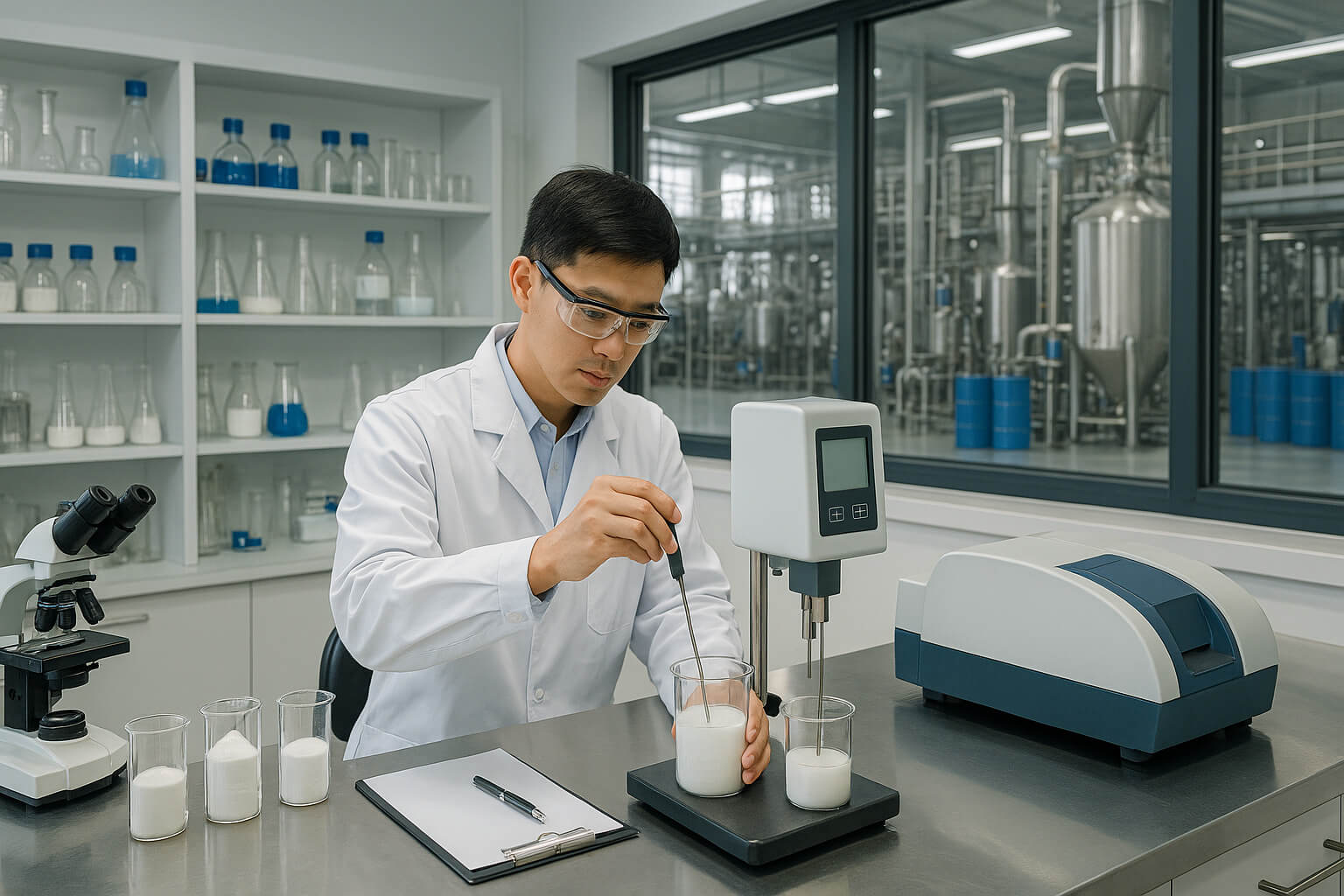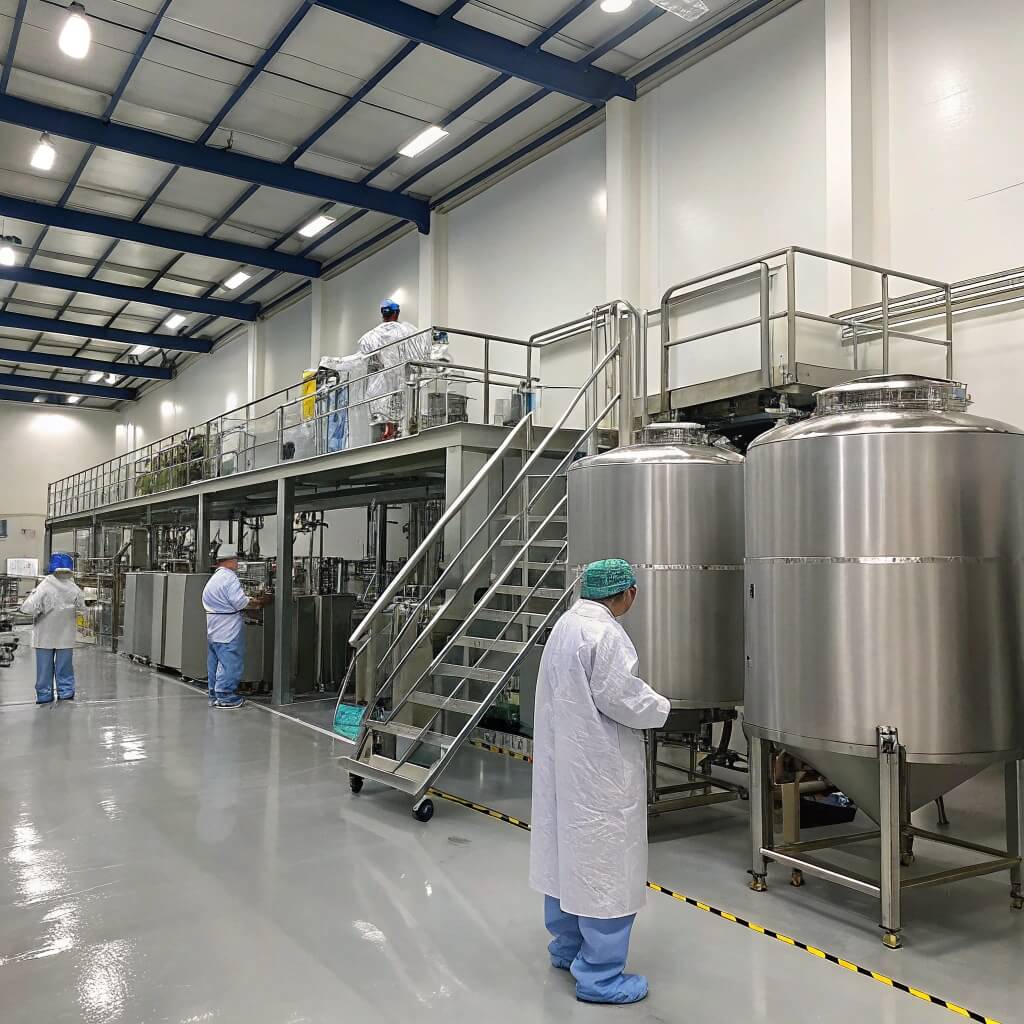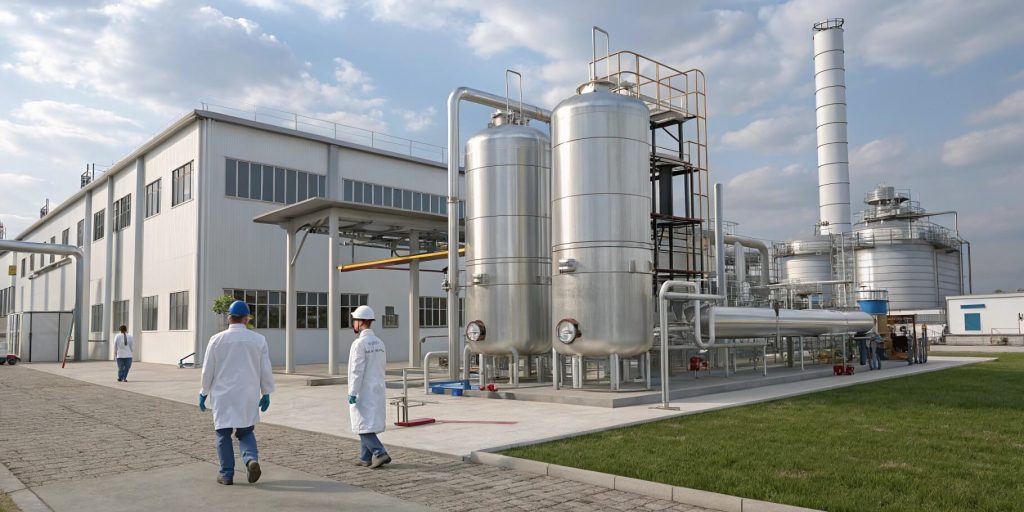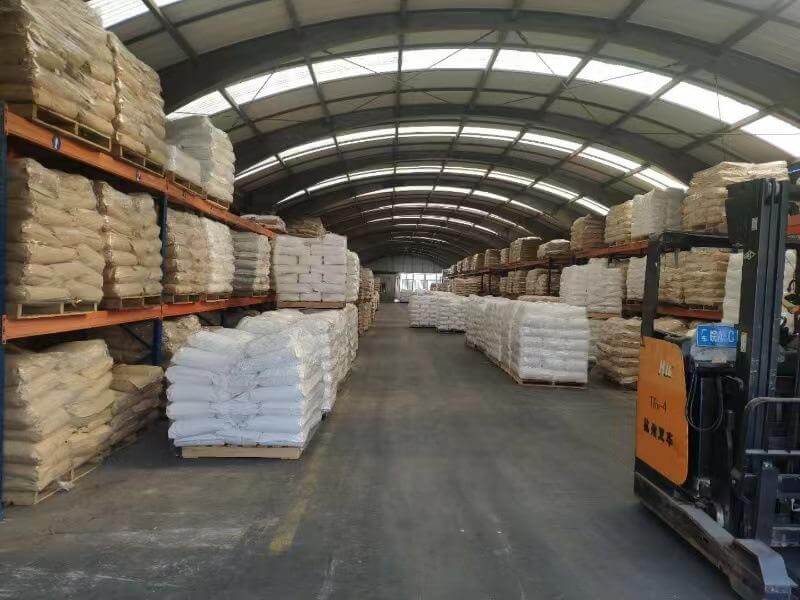Finding trustworthy HPMC suppliers feels like searching for needles in haystacks, especially when quality differences can ruin your products.
Certifications serve as proof of an HPMC manufacturer's commitment to quality, safety, and regulatory compliance. These documents validate that producers meet specific standards for their production processes, quality control systems, and final products across food, pharmaceutical, and construction applications.

Image shows a laboratory technician in white coat testing HPMC samples with quality control equipment at a manufacturing facility.
When selecting an HPMC supplier, knowing which certifications matter most helps you avoid costly mistakes and ensure product consistency. Let's examine the critical credentials any reputable manufacturer should possess.
What is the importance of certifications for HPMC manufacturers?
Your entire production line stops when raw materials fail quality tests, causing delays and lost revenue.
Certifications provide objective evidence that a manufacturer follows standardized processes and meets specific quality parameters. They verify that proper testing, documentation, and control systems are in place to deliver consistent HPMC batches that perform as expected in your applications.
We've seen firsthand how certifications impact buyer confidence. In our manufacturing facility, we maintain strict quality systems with regular audits to ensure our HPMC meets all relevant standards. These certifications aren't just paperwork—they represent real systems that prevent problems before they reach your facility.
The right certifications matter for several key reasons:
- They reduce risk of product recalls and compliance issues
- They ensure batch-to-batch consistency
- They provide traceability throughout the supply chain
- They demonstrate ethical manufacturing practices
- They open markets with strict regulatory requirements
Many buyers learn this lesson the hard way. One of our clients previously worked with an uncertified supplier whose inconsistent viscosity caused major production issues. After switching to our certified HPMC, their rejection rates dropped by 85%.
What global quality standards apply to HPMC production?
Inconsistent quality standards across regions create confusion when sourcing HPMC globally.
Global standards for HPMC production include ISO 9001 for quality management, ISO 22000 for food safety, cGMP for pharmaceuticals, and product-specific standards like USP/NF, EP, and JP for pharmaceutical grades. These certifications establish baseline requirements for manufacturing processes, facility conditions, and quality control.
Our facilities maintain multiple international certifications to serve diverse markets. For example, our pharmaceutical-grade HPMC meets USP standards for hydroxypropyl methylcellulose, ensuring consistent substitution degrees, viscosity, and purity profiles that pharmaceutical customers require.
Primary Global Standards for HPMC Production
| Standard | Focus Area | Importance for Buyers |
|---|---|---|
| ИСО 9001 | Quality Management System | Ensures consistent manufacturing processes |
| ISO 22000/FSSC 22000 | Food Safety | Critical for food-grade HPMC applications |
| cGMP | Good Manufacturing Practices | Essential for pharmaceutical applications |
| USP/NF | Pharmacopeia Standards | Defines specific HPMC properties for medicines |
| EP | European Pharmacopeia | Required for European pharmaceutical markets |
| ИСО 14001 | Environmental Management | Shows commitment to sustainable production |
We've found that meeting multiple standards requires significant investment in equipment, training, and systems. For our pharmaceutical-grade HPMC production lines, we maintain separate, dedicated facilities with specialized air handling systems and strict material segregation protocols to meet cGMP requirements.
Each standard addresses different aspects of production quality. For food-grade HPMC, FSSC 22000 certification shows we've implemented HACCP principles to prevent contamination or hazards. For construction-grade HPMC, industry standards focus more on performance characteristics like water retention and adhesion properties.
How do HPMC manufacturers ensure regulatory compliance across industries?
Navigating complex regulations for different HPMC applications creates significant challenges for procurement teams.
Manufacturers ensure compliance through dedicated quality departments, regular testing, certified analytical methods, and detailed documentation systems. This includes maintaining Drug Master Files (DMFs) for pharmaceutical applications, implementing Hazard Analysis Critical Control Points (HACCP) for food-grade production, and conducting regular internal and external audits.
At our facilities, we use a structured approach to regulatory compliance based on end-use requirements. Our quality control department performs over 30 different tests on each HPMC batch, including viscosity, substitution degree, particle size, and application-specific performance tests. These results are documented in batch records that provide complete traceability.
For pharmaceutical applications, we maintain Type II Drug Master Files with Регистрация FDA that document our manufacturing processes, testing methods, and stability data. This simplifies our customers' regulatory submissions when using our HPMC in their formulations.
Food-grade HPMC production requires additional precautions. We've implemented allergen control programs, foreign material detection systems, and microbiological testing protocols that comply with FDA food additive regulations. Our food-grade HPMC meets E464 specifications required for European markets.
For construction applications, we test water retention, workability, and adhesion properties according to industry standards. Each testing method is validated and performed by trained technicians using calibrated equipment to ensure accurate, consistent results.
Which specific certifications do top HPMC manufacturers typically hold?
Finding manufacturers with all necessary certifications seems impossible when every application has different requirements.
Top HPMC manufacturers typically hold basic quality certifications like ISO 9001, industry-specific certifications like FSSC 22000 for food applications or cGMP for pharmaceuticals, plus environmental certifications like ISO 14001. The best suppliers also maintain product-specific certifications such as kosher, halal, non-GMO, and regional pharmacopeia compliance.
In our ten years of manufacturing experience, we've built a comprehensive certification portfolio to meet global requirements. Our key certifications include:
- ISO 9001:2015 for overall quality management
- FSSC 22000 for food safety systems
- cGMP compliance for pharmaceutical production
- USP/NF, EP, and JP pharmacopeia compliance
- Kosher and Halal certification for specialty markets
- ISO 14001 for environmental management
- REACH registration for European chemical regulations
Each certification requires dedicated resources and continuous improvement. For example, maintaining cGMP compliance involves regular Аудиты третьей стороны to verify our facilities meet current pharmaceutical manufacturing standards. These audits examine everything from water quality to employee training records.
Beyond formal certifications, we also maintain extensive testing capabilities to verify our HPMC meets industry-specific performance requirements. This includes specialized equipment for measuring viscosity under various conditions, substitution degree analysis, and application testing that simulates real-world use cases in different industries.
What documentation should buyers request from HPMC suppliers?
Incomplete supplier documentation leads to quality risks, compliance issues, and production problems.
Buyers should request certificates of analysis (CoAs) for each batch, technical data sheets with detailed specifications, safety data sheets (SDS), regulatory compliance certificates, production process information, stability data, and audit reports or certifications. These documents verify the supplier's quality systems and the specific properties of their HPMC.
We provide complete documentation packages to our customers, starting with detailed CoAs that include all critical parameters for each HPMC batch. These reports show actual test results against specification limits, giving buyers confidence in product consistency.
For pharmaceutical applications, we offer:
- Drug Master File (DMF) letters of access
- GMP compliance certificates
- Residual solvents analysis
- Heavy metals testing results
- Microbial testing documentation
Food-grade HPMC requires additional documentation:
- Non-GMO certification
- Allergen statements
- Nutritional information
- Compliance with E464 specifications
- Migration testing results for packaging applications
Construction-grade HPMC should include:
- Water retention values
- Workability testing results
- Adhesion performance data
- Compatibility with common cement systems
Quality suppliers will provide documentation promptly and answer technical questions about their test methods. We maintain digital document management systems that allow us to quickly respond to customer requests, often providing certificates within hours rather than days.
How can buyers identify qualified and validated HPMC manufacturers?
Many suppliers claim quality excellence, but their products tell different stories when tested in your applications.
Buyers can identify qualified manufacturers by verifying their certifications with issuing bodies, reviewing detailed batch records and CoAs, requesting facility audit reports, testing product samples, checking customer references, and evaluating technical support capabilities. The most reliable manufacturers welcome facility visits and provide transparent information about their production processes.
Our approach to qualifying new customers involves complete transparency. We encourage facility visits where procurement teams can inspect our 30,000-ton annual production capacity, quality control laboratories, and warehousing systems. During these visits, we demonstrate our testing methods and production controls that ensure batch-to-batch consistency.
Beyond certifications, experienced buyers evaluate:
- Production capacity and redundancy
- Raw material sourcing and quality control
- Equipment capabilities and maintenance programs
- Staff expertise and training systems
- Sample consistency across multiple batches
- Technical support resources
- Emergency response protocols
- Supply chain resilience
One effective qualification method is to request samples from different production batches and test them under your specific application conditions. We regularly provide validation batches to new customers so they can verify our HPMC performs consistently in their processes before placing larger orders.
When evaluating potential suppliers, examine how they handle non-conformances and customer complaints. Quality manufacturers maintain formal systems for investigating issues, implementing corrective actions, and preventing recurrence. We track all customer feedback in our quality management system and use this data to drive continuous improvement in our production processes.
Часто задаваемые вопросы
Каковы различные марки ГПМЦ?
HPMC comes in pharmaceutical, food, and construction grades, each with specific properties for their applications. Pharmaceutical grades meet USP/EP standards with strict purity requirements. Food grades comply with E464 specifications and food safety regulations. Construction grades focus on water retention, workability, and adhesion properties for dry-mix mortars and other building materials.
What is E5 grade of HPMC?
E5 grade HPMC refers to a specific viscosity classification with 5 mPa·s (millipascal-seconds) measured in a 2% solution at 20°C. This low-viscosity grade is commonly used in pharmaceutical tablet coatings, dry-mix mortars, and certain food applications where minimal thickening is desired. E5 provides good film-forming properties with minimal impact on solution viscosity.
В чем разница между HPMC E5 и E15?
The main difference between HPMC E5 and E15 is viscosity—E5 measures 5 mPa·s while E15 measures 15 mPa·s in a 2% solution. E5 creates thinner solutions suitable for spray applications and tablet coatings. E15 provides more thickening power for adhesives and cement-based products. Both have similar chemical properties but different chain lengths, affecting their performance in specific applications.
What is the difference between HPC and HPMC?
HPC (hydroxypropyl cellulose) and HPMC (hydroxypropyl methylcellulose) differ in their chemical structure and properties. HPC contains only hydroxypropyl substitutions while HPMC has both methoxy and hydroxypropyl groups. This gives HPMC better thermal gelation properties and pH stability. HPC dissolves in cold water and some organic solvents, while HPMC forms gels at higher temperatures and offers better film flexibility.
Заключение
Selecting an HPMC manufacturer with the right certifications directly impacts your product quality, regulatory compliance, and business reputation. These credentials verify that suppliers maintain consistent production processes, quality control systems, and documentation practices needed for your specific applications.
The most reliable HPMC suppliers maintain multiple international certifications, provide comprehensive documentation, and welcome facility audits to demonstrate their commitment to quality. They also offer technical support to help you optimize HPMC performance in your specific applications.
Contact Morton for samples of our certified HPMC and compare our product performance in your applications. Our technical team can help select the optimal grade for your specific needs while ensuring all regulatory requirements are met.




